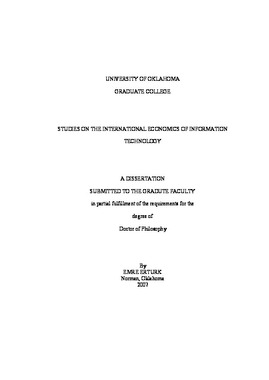| dc.contributor.advisor | Kondonassis, Alex, | en_US |
| dc.contributor.author | Erturk, Emre. | en_US |
| dc.date.accessioned | 2013-08-16T12:20:36Z | |
| dc.date.available | 2013-08-16T12:20:36Z | |
| dc.date.issued | 2007 | en_US |
| dc.identifier.uri | https://hdl.handle.net/11244/1167 | |
| dc.description.abstract | The first study statistically analyzes the relationship between computer technology use and economic productivity using international data. At the end of this first study, the findings show a positive relationship between computer technology and productivity. In the second study, free Linux software is examined as an example of how computer technology may benefit less developed countries in the future. Here the level of human capital is determined to be a key factor that influences the ability of people in a country to adopt software technology. In the third study, international software outsourcing is discussed in order to illustrate how human capital plays an important role in national economic development. In addition, the potential benefits of outsourcing for both the developed and the less developed countries are underscored. | en_US |
| dc.description.abstract | The computer is an example of a general purpose technology, a leap of innovation that affects entire economies and causes drastic advancement. Specifically, the Internet works as a virtual large-scale international community of economic integration, and contributes to economic development around the world. The Internet has reduced the cost of communication, increased the amount of communication and information worldwide, and thereby increased commerce for a variety of goods and services. In the dissertation, the economic roles of innovation and technology are discussed in detail with specific examples from the field of computer technology. | en_US |
| dc.description.abstract | This dissertation is a collection of three separate studies, which synergistically demonstrate how information technology (with emphases on the Internet and software) contributes to increases in economic productivity and economic development in general. The three studies also highlight how the quality and quantity of human capital influence a country's ability to benefit from computer technology and the Internet. | en_US |
| dc.format.extent | x, 122 leaves : | en_US |
| dc.subject | Economics, Commerce-Business. | en_US |
| dc.subject | Computer software Development Economic aspects. | en_US |
| dc.subject | Diffusion of innovations. | en_US |
| dc.subject | Open source software Economic aspects. | en_US |
| dc.subject | Technology transfer. | en_US |
| dc.subject | Information technology Economic aspects. | en_US |
| dc.subject | Economics, Labor. | en_US |
| dc.subject | Offshore assembly industry. | en_US |
| dc.subject | Economics, General. | en_US |
| dc.subject | Industrial productivity. | en_US |
| dc.title | Studies on the international economics of information technology . | en_US |
| dc.type | Thesis | en_US |
| dc.thesis.degree | Ph.D. | en_US |
| dc.thesis.degreeDiscipline | Department of Economics | en_US |
| dc.note | Source: Dissertation Abstracts International, Volume: 68-03, Section: A, page: 1089. | en_US |
| dc.note | Adviser: Alex Kondonassis. | en_US |
| ou.identifier | (UMI)AAI3257949 | en_US |
| ou.group | College of Arts and Sciences::Department of Economics | |
